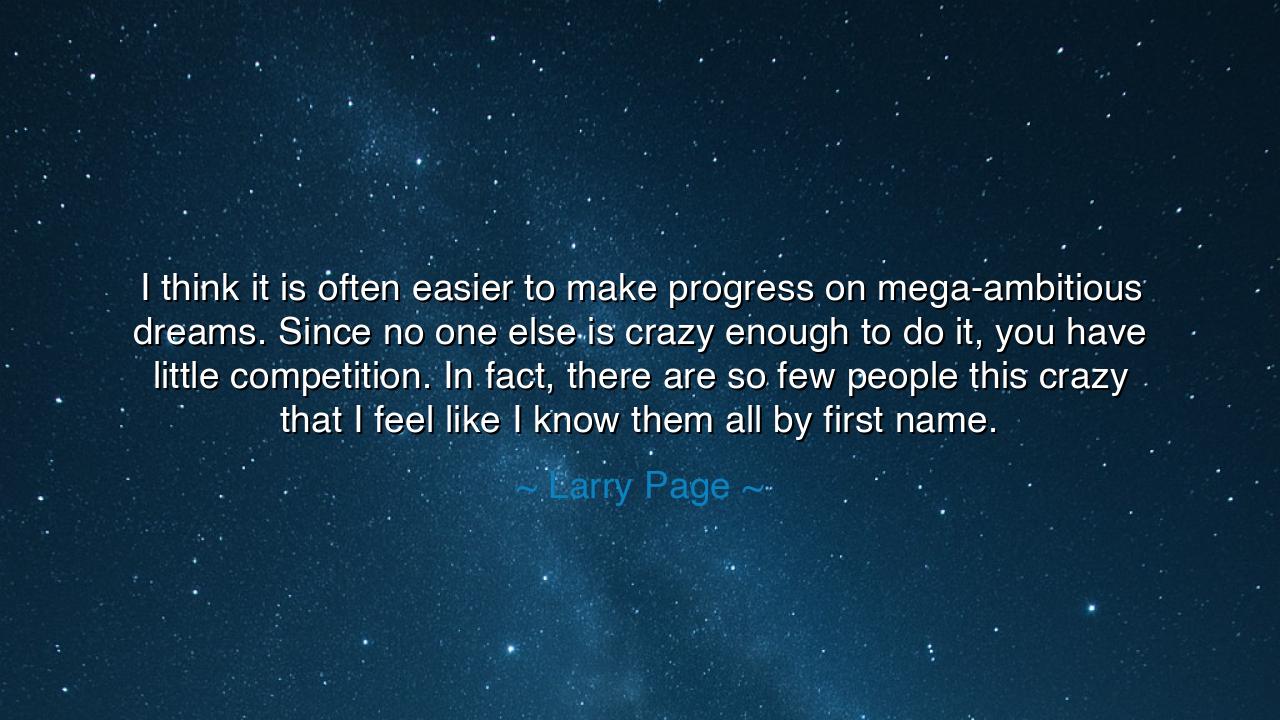
I think it is often easier to make progress on mega-ambitious
I think it is often easier to make progress on mega-ambitious dreams. Since no one else is crazy enough to do it, you have little competition. In fact, there are so few people this crazy that I feel like I know them all by first name.






Larry Page’s words, "I think it is often easier to make progress on mega-ambitious dreams. Since no one else is crazy enough to do it, you have little competition. In fact, there are so few people this crazy that I feel like I know them all by first name," hold within them a profound and powerful truth. It is the paradox of the dreamer—that the path to the most visionary goals is often the one least traveled. When one sets their sights on something grand, something unimaginable, it is not met with the normal competition of others; instead, it is met with resistance born of doubt and fear. The crazy few who dare to venture down that road are not bound by the constraints of convention, but by their vision, driven by the belief that greatness lies in the pursuit of what others deem impossible.
This idea is not new to the ancient world. The Greeks, in their endless search for knowledge and understanding, often spoke of the heroic journey—the pursuit of goals so grand that they appeared unattainable. Consider Heracles, whose labors were undertaken not because they were easy but because they were beyond the reach of most men. He sought greatness through challenges that others had not dared to face, and it was precisely this ambition—this reckless courage—that made him a figure of legend. The pursuit of the impossible separates the hero from the ordinary, just as Larry Page suggests that it is the audacity of the dreamer that creates the fewest competitors in the field.
It is this audacity that is often the precursor to the most remarkable innovations in history. Thomas Edison, the inventor who brought the light bulb into the world, did not succeed by playing it safe. He pursued an idea that was so radical, so ambitious, that he faced scorn, ridicule, and failure at every turn. And yet, it was precisely his willingness to embrace the impossible that set him apart. In the same way, Page’s pursuit of technology so transformative that it could reshape the way the world communicated and operated faced not competition, but skepticism. Only through the fearlessness to dream big and the determination to persist in the face of doubt did he—and others like him—create what was thought to be beyond reach.
The lesson that Page’s words offer is profound: in the realm of the mega-ambitious dream, the greatest obstacle is not the lack of competition, but the fear and hesitation that hold most people back from even attempting the journey. The dreamers—those who are "crazy enough" to take on the monumental tasks—often find that the true battle is with the self, against the limits imposed by society, fear, and doubt. The very fact that there are so few who dare to dream these grand dreams means that the competition is scarce, and the path to achievement is clearer for those who are willing to push forward.
Page's reflection also speaks to the nature of visionary work—that it is often lonely at the top. As the pioneers of innovation, these few brave souls often find themselves in solitude, surrounded by only a handful of those who share their vision. Yet, this solitude is not a burden but a privilege. It is in the quiet persistence of those who dream beyond the horizon that the world is changed. Much like the Renaissance artists and thinkers—Michelangelo, Galileo, Leonardo da Vinci—whose works reshaped their world, the dreamers of today are the ones who dare to see the future and begin creating it before anyone else can even imagine it.
To live this truth in our own lives requires a radical shift in perspective. We must first embrace the idea that dreaming big is not only possible but also necessary. The path to greatness is not one of comfort but of boldness, of stepping into the unknown with the full knowledge that the world may not understand or support us. It is a call to look at the unrealized and ask, "Why not me? Why not now?" As Page suggests, in the realm of the impossible, we are not facing fierce competition but are instead part of a select few who, through courage and persistence, can change the world.
In practical terms, let us take action by dreaming without limits and pursuing those impossible goals that others may deem foolish or unattainable. Let us not be discouraged by the lack of competition, but rather see it as an invitation to step boldly into the realm of the unknown. Surround yourself with those who share your passion, and dare to be among the few who walk the path of the visionary. By doing so, we may not only achieve our dreams, but also create a legacy that inspires future generations to dream even bigger.






AAdministratorAdministrator
Welcome, honored guests. Please leave a comment, we will respond soon